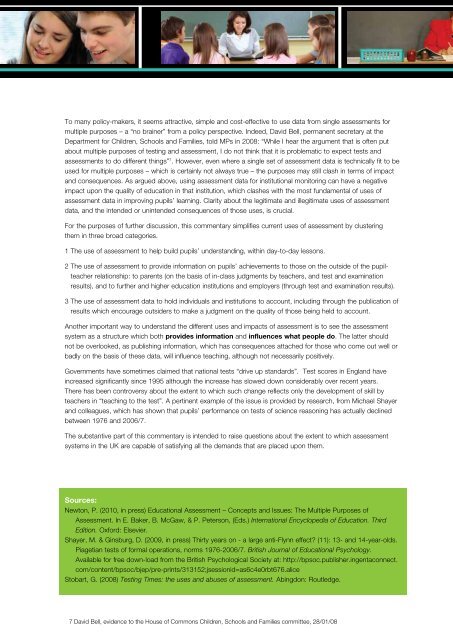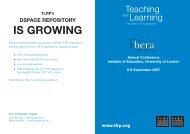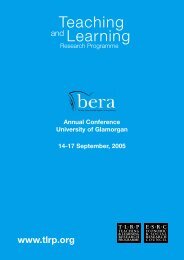Assessment in schools Fit for purpose? - Teaching and Learning ...
Assessment in schools Fit for purpose? - Teaching and Learning ...
Assessment in schools Fit for purpose? - Teaching and Learning ...
Create successful ePaper yourself
Turn your PDF publications into a flip-book with our unique Google optimized e-Paper software.
To many policy-makers, it seems attractive, simple <strong>and</strong> cost-effective to use data from s<strong>in</strong>gle assessments <strong>for</strong><br />
multiple <strong>purpose</strong>s – a “no bra<strong>in</strong>er” from a policy perspective. Indeed, David Bell, permanent secretary at the<br />
Department <strong>for</strong> Children, Schools <strong>and</strong> Families, told MPs <strong>in</strong> 2008: “While I hear the argument that is often put<br />
about multiple <strong>purpose</strong>s of test<strong>in</strong>g <strong>and</strong> assessment, I do not th<strong>in</strong>k that it is problematic to expect tests <strong>and</strong><br />
assessments to do different th<strong>in</strong>gs” 7 . However, even where a s<strong>in</strong>gle set of assessment data is technically fit to be<br />
used <strong>for</strong> multiple <strong>purpose</strong>s – which is certa<strong>in</strong>ly not always true – the <strong>purpose</strong>s may still clash <strong>in</strong> terms of impact<br />
<strong>and</strong> consequences. As argued above, us<strong>in</strong>g assessment data <strong>for</strong> <strong>in</strong>stitutional monitor<strong>in</strong>g can have a negative<br />
impact upon the quality of education <strong>in</strong> that <strong>in</strong>stitution, which clashes with the most fundamental of uses of<br />
assessment data <strong>in</strong> improv<strong>in</strong>g pupils’ learn<strong>in</strong>g. Clarity about the legitimate <strong>and</strong> illegitimate uses of assessment<br />
data, <strong>and</strong> the <strong>in</strong>tended or un<strong>in</strong>tended consequences of those uses, is crucial.<br />
For the <strong>purpose</strong>s of further discussion, this commentary simplifies current uses of assessment by cluster<strong>in</strong>g<br />
them <strong>in</strong> three broad categories.<br />
1 The use of assessment to help build pupils’ underst<strong>and</strong><strong>in</strong>g, with<strong>in</strong> day-to-day lessons.<br />
2 The use of assessment to provide <strong>in</strong><strong>for</strong>mation on pupils’ achievements to those on the outside of the pupilteacher<br />
relationship: to parents (on the basis of <strong>in</strong>-class judgments by teachers, <strong>and</strong> test <strong>and</strong> exam<strong>in</strong>ation<br />
results), <strong>and</strong> to further <strong>and</strong> higher education <strong>in</strong>stitutions <strong>and</strong> employers (through test <strong>and</strong> exam<strong>in</strong>ation results).<br />
3 The use of assessment data to hold <strong>in</strong>dividuals <strong>and</strong> <strong>in</strong>stitutions to account, <strong>in</strong>clud<strong>in</strong>g through the publication of<br />
results which encourage outsiders to make a judgment on the quality of those be<strong>in</strong>g held to account.<br />
Another important way to underst<strong>and</strong> the different uses <strong>and</strong> impacts of assessment is to see the assessment<br />
system as a structure which both provides <strong>in</strong><strong>for</strong>mation <strong>and</strong> <strong>in</strong>fluences what people do. The latter should<br />
not be overlooked, as publish<strong>in</strong>g <strong>in</strong><strong>for</strong>mation, which has consequences attached <strong>for</strong> those who come out well or<br />
badly on the basis of these data, will <strong>in</strong>fluence teach<strong>in</strong>g, although not necessarily positively.<br />
Governments have sometimes claimed that national tests “drive up st<strong>and</strong>ards”. Test scores <strong>in</strong> Engl<strong>and</strong> have<br />
<strong>in</strong>creased significantly s<strong>in</strong>ce 1995 although the <strong>in</strong>crease has slowed down considerably over recent years.<br />
There has been controversy about the extent to which such change reflects only the development of skill by<br />
teachers <strong>in</strong> “teach<strong>in</strong>g to the test”. A pert<strong>in</strong>ent example of the issue is provided by research, from Michael Shayer<br />
<strong>and</strong> colleagues, which has shown that pupils’ per<strong>for</strong>mance on tests of science reason<strong>in</strong>g has actually decl<strong>in</strong>ed<br />
between 1976 <strong>and</strong> 2006/7.<br />
The substantive part of this commentary is <strong>in</strong>tended to raise questions about the extent to which assessment<br />
systems <strong>in</strong> the UK are capable of satisfy<strong>in</strong>g all the dem<strong>and</strong>s that are placed upon them.<br />
Sources:<br />
Newton, P. (2010, <strong>in</strong> press) Educational <strong>Assessment</strong> – Concepts <strong>and</strong> Issues: The Multiple Purposes of<br />
<strong>Assessment</strong>. In E. Baker, B. McGaw, & P. Peterson, (Eds.) International Encyclopedia of Education. Third<br />
Edition. Ox<strong>for</strong>d: Elsevier.<br />
Shayer, M. & G<strong>in</strong>sburg, D. (2009, <strong>in</strong> press) Thirty years on - a large anti-Flynn effect? (11): 13- <strong>and</strong> 14-year-olds.<br />
Piagetian tests of <strong>for</strong>mal operations, norms 1976-2006/7. British Journal of Educational Psychology.<br />
Available <strong>for</strong> free down-load from the British Psychological Society at: http://bpsoc.publisher.<strong>in</strong>gentaconnect.<br />
com/content/bpsoc/bjep/pre-pr<strong>in</strong>ts/313152;jsessionid=as6c4e0rbt676.alice<br />
Stobart, G. (2008) Test<strong>in</strong>g Times: the uses <strong>and</strong> abuses of assessment. Ab<strong>in</strong>gdon: Routledge.<br />
7 David Bell, evidence to the House of Commons Children, Schools <strong>and</strong> Families committee, 28/01/08

















